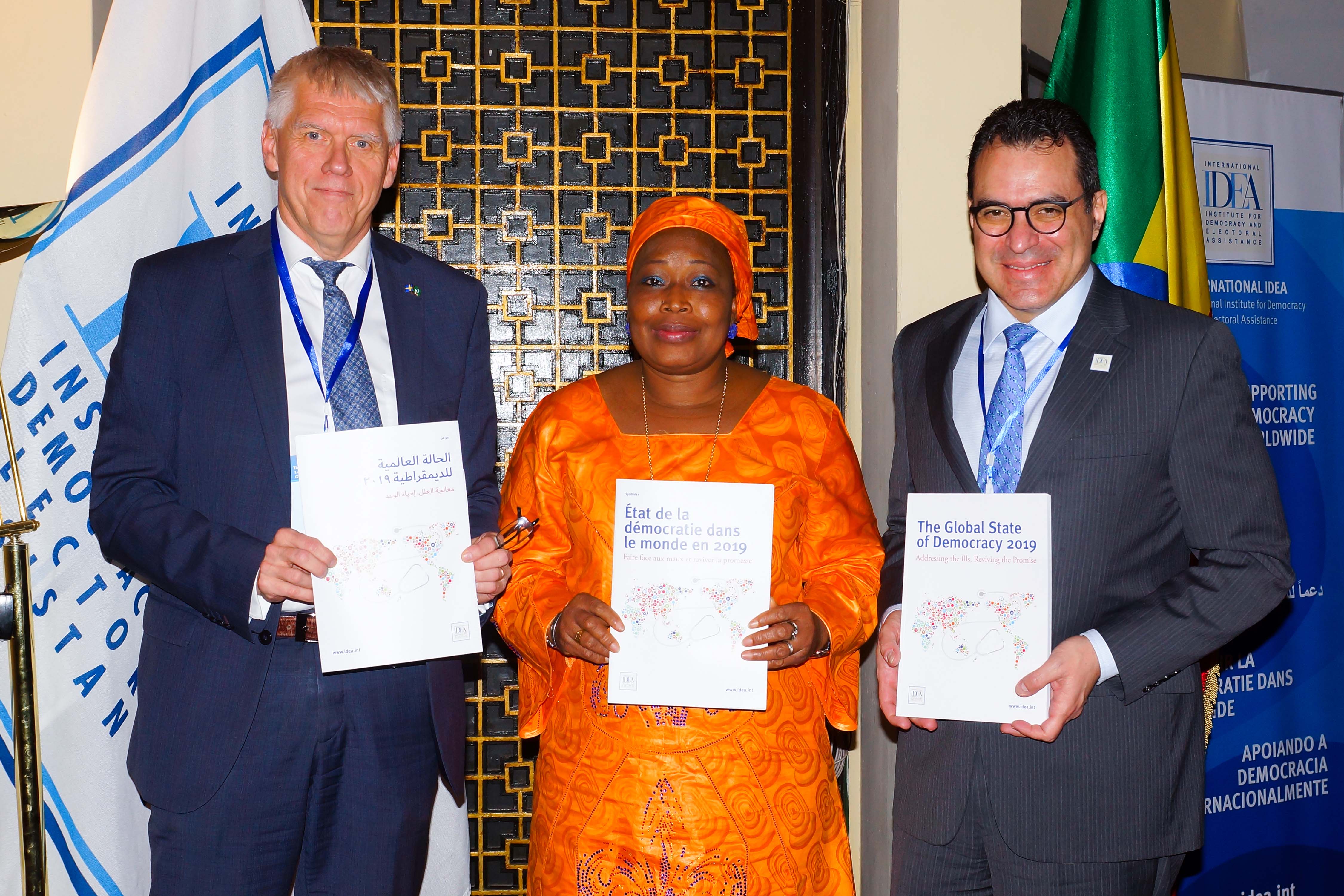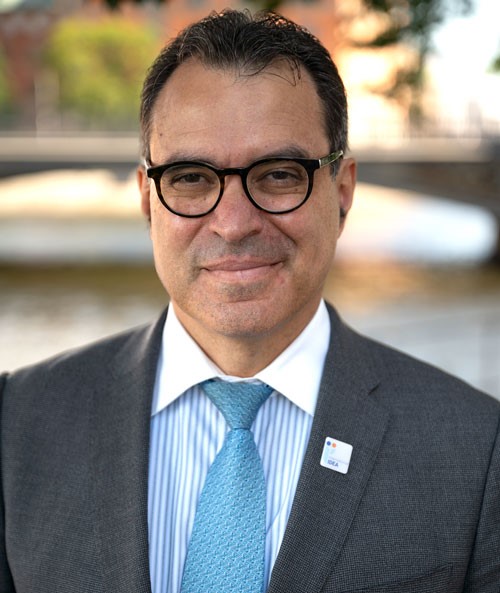The State of Democracy in Africa
"Democracy is experiencing severe challenges all over the world."

I would like to start by thanking the representatives of the Member States of International IDEA, particularly those of African Member States, as well as other members of the diplomatic community and colleagues from the African Union, the United Nations, and so many other international organizations, who have been kind enough to accept our invitation to come today. I would also like to welcome, of course, the many Ethiopian state officials that are honoring us with their presence. I want to acknowledge and express my gratitude for the hospitality of your country, which hosts our regional office for Africa and West Asia.
It is a joy to be in Addis Ababa for the first time. I always wanted to come here to check on the fanciful rumor that there was one country on Earth that had better coffee than Costa Rica. I must now report, with sadness, that the rumor is true.
I come from the Global South. And there is always more than a little affinity when I visit another developing country, and I recognize anew the enormous challenges of establishing democratic institutions while confronting the steep obstacles that stand in the way of human development. Building democratic institutions in the developing world is twice as difficult. That makes all the more precious and worthy of our support the democratic openings that we are witnessing in unexpected places, including Ethiopia. What is happening here is truly inspirational. I’m under no illusions with regards to the monumental difficulty of the task. The path ahead is full of pitfalls. But one thing we have learned is that no one can chart that path for you. You have to chart it yourselves in the way that best suits your circumstances. True to its mandate, International IDEA is not here to prescribe, but to support. Anyway, it’s wonderful to be here.
Dear friends:
Democracy is experiencing severe challenges all over the world. The sense of hope and inevitability that infused democracy’s remarkable expansion during the second half of the Twentieth Century is all but gone. Pessimism and hand-wringing about the health of democracy have become the norm.
"Is democracy seriously ill? And if so, what are the remedies?"
These are the questions that International IDEA is trying to answer with the Global State of Democracy Report that we are launching here today.
For those of you who may not be so familiar with International IDEA, it may be worth saying a few words about our institute and its work.
We are an inter-governmental organization, with 33 member states from all regions of the world, whose mission is supporting and advancing democracy worldwide.
"How have we done that for the past 25 years?"
Well, International IDEA is a peculiar institution. It has a dual nature and takes pride in calling itself a “think-and-do-tank”. We think, because for 25 years we have been producing produce high quality, evidence-based comparative knowledge on electoral systems, political reform, constitutional design, gender equality in politics, and democratic governance writ large. We do, because we apply that knowledge and expertise through technical assistance on the ground. Currently we are active, in different modalities, in over 70 countries around the world. And proudly we have integrated work on Africa into our agenda since the very outset.
International IDEA embodies the notion that the struggle to advance democracy should not be a solitary endeavor; that there’s value in systematizing and facilitating comparative knowledge and experience about democratic processes to those that are on the trenches building democracy.
Our Global State of Democracy Initiative is grounded in this vocation to produce policy oriented and impactful political research. And let me say that it is a unique initiative. It is currently the only global report on democracy developed by an inter-governmental organization.
This project started out in 2016 with the generous financial support from Sweden, our host country, and already yielded a first report, published in 2017. What you have in your hands is the second iteration of a global health check on democracy that we hope to continue publishing every 2 years as one of our flagship research products.
The report provides a comprehensive analysis on the state of democracy around the world, based on very robust data. The Global State of Democracy Indices that underpin our analysis have been developed through close collaboration with the Varieties of Democracy Institute (V-Dem) at the University of Gothenburg, in Sweden. Indeed, I want to stress that we appreciate enormously the support of V-Dem, whose data is one of the primary inputs of our report. The Indices cover 97 indicators of political performance, for 158 countries, stretching back to 1975, and then year after year until 2018.
This is a very significant research effort whose timing is particularly important given the current opinion climate that surrounds democracy. The prevailing negative narrative is not devoid of consequences, and, in some cases, is peddled in a self-interested way. Before we accept it face value, at the very least we have the duty to pass it through the acid test of reality.
This is what we try to do here. The report is, in a way, an attempt to shift the current narrative about democracy –as seen in the media and global debate—to a more nuanced discussion, which showcases the challenges, but also the advances of democracy in the world.
And, moreover, we do this in a way that provides an empirically rigorous diagnosis as well as policy recommendations to address the challenges and harness the opportunities for democracy. These recommendations have been developed on the basis of lessons learned from our institute’s work over more than two decades of facilitating technical assistance for democratic reforms around the world.
The report is oriented and adapted to policy-makers as well as practitioners. The data can help multilateral and international organizations identify priority areas for reform and priority countries for support. But it also provides arguments and analytical tools for civil society organizations advocating for democracy.
Crucially, the report also fills an important knowledge gap, looking at the links between democracy and sustainable development and the 2030 agenda. Help countries track progress on reforms and on the achievement of the 2030 agenda. The GSoD Indices help to track progress on 8 SDGs and in particular SDG 16 (on Peace, Justice and Strong Institutions) and SDG 5.5 (on the political participation of women).
This work also helps to better understand and unpack complex global phenomena and their implications for democracy and for societies more broadly, for instance the drivers and impact of populism; democratic backsliding; the risks connected to elections in challenging contexts; the corrosive impact of corruption and money in politics; and the ambiguous impact of information and communication technologies on democracy.
Today’s launch hopes to provide you insights to some of the key findings of the report. It is merely a way to kick start a conversation. In fact, we hope that you will read the report, or at least some of the regional chapters that may be of your particular interest, and use this material as a reference for your work on democracy and governance issues.
Shedding light on both the predicament of democracy and the possible solutions is the intention that drives this effort. As all the work that International IDEA does globally, this research is infused with a sense of urgency, but also of possibility and hope. Through this report we want to provide actionable knowledge, tools, and advice to the actors working on democratic reform processes at the sub-national, national, and regional levels. We want to empower and enlighten, sustain and support, reinvigorate and relaunch the efforts to protect and advance democracy around the world. Only through a vast collective effort, fired by passion and conviction but also grounded on facts, will we be able to ensure that we address democracy’s ills and revive its promise.
Thank you all for being here.
